Elipse E3 contributes to sustainability via supervision of Aperam Bioenergia’s carbonization kilns
Platform developed by Elipse Software monitors and controls temperatures so as to enable Aperam BioEnergia to produce charcoal more efficiently and with more sustainability
Published on 12/19/2023
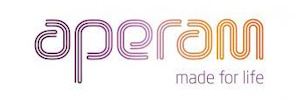
Needs
Aperam BioEnergia produces charcoal via carbonization of renewable forests of eucalypt wood in Minas Gerais, Brazil, cultivated by the company in a 100-thousand-hectare area. The charcoal produced in this field is used in its entirety as input for making steel in a steel plant located in Timóteo, a municipality in the southeast.
However, charcoal produced by burning wood, if not handled properly, is one of the main pollutants to the atmosphere through extensive gas emissions. Therefore, to become a reference for sustainability in the area, Aperam BioEnergia has invested in the implementation of supervisory systems, one for each of its six REPs (Renewable Energy Powerhouses). They are: Pontal, Palmeiras, Lagoa, Cruz Grande, Chácara, and São Bento.
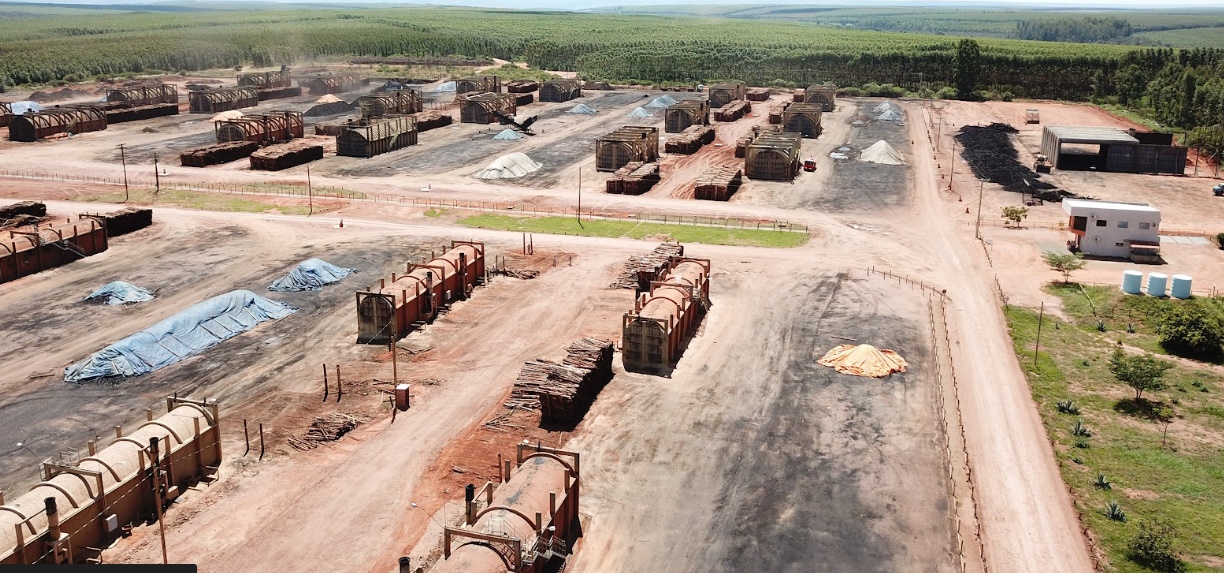
Carbonization kilns at Palmeiras REP
Based in Jequitinhonha River valley, in Minas Gerais, the six REPs make up around 450 tons of charcoal per year. Connected by underground pipes to the REPs, the burners channel the smoke generated in the kilns to a combustion chamber where the smoke is then incinerated and emitted as a non-pollutant water vapor to the atmosphere. Every year, more than 150 thousand tons of carbon dioxide are kept from being emitted to the environment due to those burners.
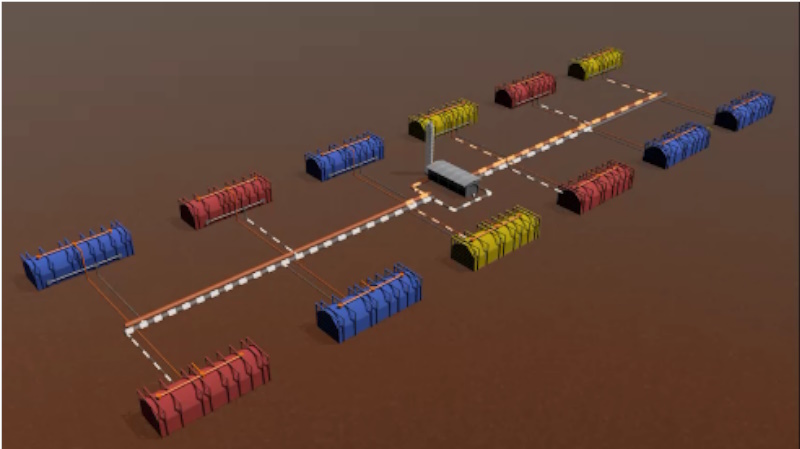
Kilns connected via underground pipes to the burner at the center of the image
In order to optimize the temperature control inside these carbonization kilns, Aperam BioEnergia has opted for Elipse E3 due to how easily it can be accessed in this scenario. Elipse E3 is a platform by Elipse Software, the global software developer of remote and real-time process management solutions. The solution provider for this project was COM3 Engenharia de Sistemas.
Solution
With Elipse E3, Aperam BioEnergia can monitor temperatures of both carbonization and cooling processes in the charcoal kilns. It’s also possible to follow both endo- and exothermal temperatures’ oscillation in chart mode.
With this control, the company can produce charcoal more safely and more efficiently, since the internal temperature of kilns must be controlled rigorously so as to ensure charcoal control to increase the performance in high kilns. All six plants’ tech packs have their own burners, which incinerate carbonization gases in order to reduce emissions and thus guarantee the process’ sustainability.
In addition to monitoring temperatures, Elipse E3 also displays the number of acknowledged alarms, the percentual of OEE indicators and carbonization time of the kilns, as well as the best possible time for unloading, via a curve following the kilns’ ideal cooling. It’s also possible to oversee the number of kilns on carbonization and cooling modes. This monitoring is very important, due to the control of burning rates versus the production plan for the plants.
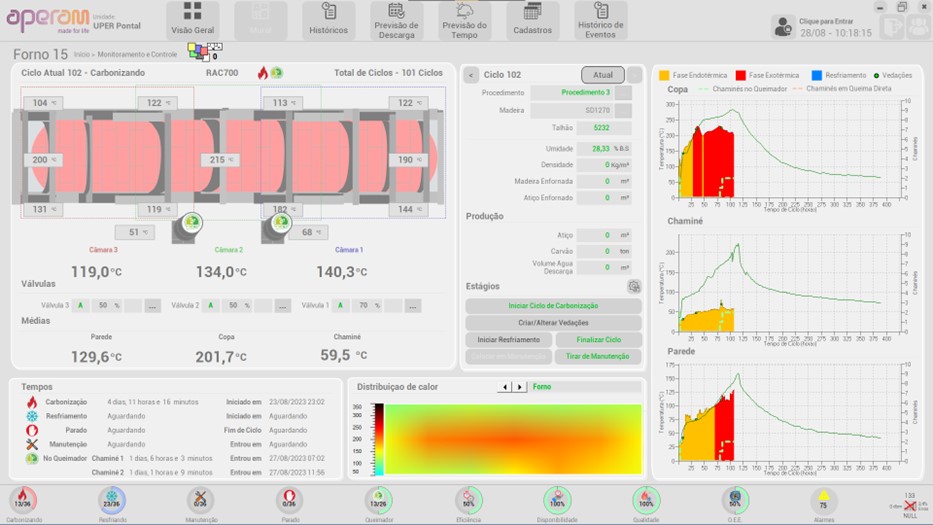
Controlling one of the carbonization kilns
The Elipse platform also allows issuing commands over sealings and valves. With them, the kiln operator can better control temperature oscillations as needed. For example: During carbonization, the tendency is to open the valves so that more air can be let in, and temperatures can increase; in cooling, it’s the other way around. Both can be achieved via Elipse E3.
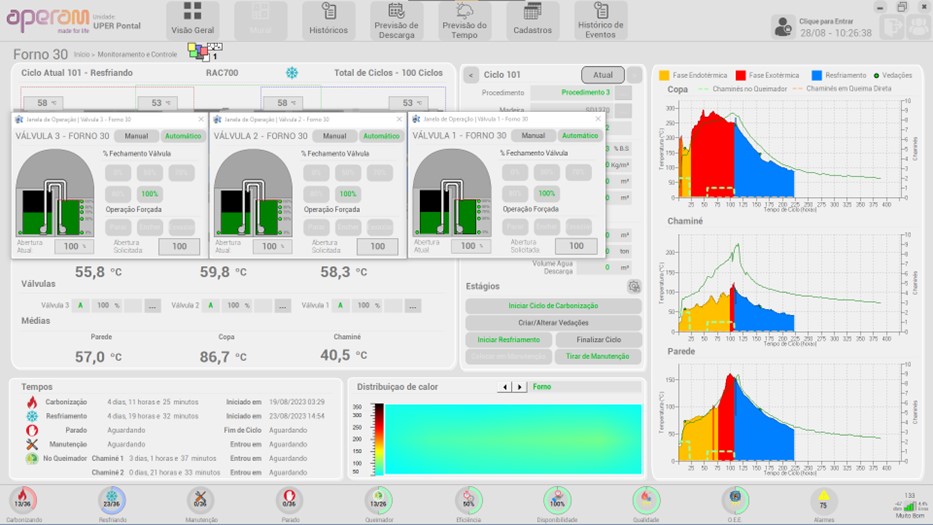
Controlling the valves of kilns
With the software by Elipse, the carbonizer is no longer required to focus its efforts on collecting temperatures, but on keeping kilns within an ideal temperature range. So, with more flexibility to make decisions and execute actions, Aperam BioEnergia is able to better control its processes and therefore increase productivity, in addition to providing stability to product quality indicators.
This stage of automation has allowed the company to obtain gravimetric gains that are above market average, thus ensuring better use of raw material (wood). Gravimetric gains are indicators used for measuring charcoal production efficiency and represent the massive conversion of wood into charcoal.
According to the Center for Strategic Studies and Management (CGEE), the gravimetric gains of production systems with no temperature control technologies or no software for carbonization are around 26% or less, depending on the carbonizer. Automated production systems, on the other hand, have presented 38/39% percent of gravimetric gains.
Benefits
Among the main benefits Elipse E3 has brought to the automation of Aperam BioEnergia’s charcoal carbonization/cooling processes, we highlight the following:
- Greater control and efficiency of the processes of carbonization and cooling, which result in more profit and better quality of production.
- Production gravimetric gains are around 38% and 39%.
- Standardized carbonization procedures.
- Improved risk management.
- Minimized losses with kilns, ducts, and burners maintenance.
- Minimized gas emission, especially when compared to other plants with no temperature control platforms in operation.
- Relocation of workforce, who can now control the whole operation via software by Elipse from the operations room.
- Better work conditions.
- Fewer fire hotspots, which increases safety of operation.
- Trends and inconsistencies in the process are now more easily spotted.
- Real-time insights.
Datasheet
Client: Aperam Bioenergia
Solution provider: COM3 Engenharia de Sistemas
Elipse product: Elipse E3
Platform: Windows Server 2022
Number or copies: 6
I/O points: 5 E3 Server 1500 tags and 1 E3 Server 3000 tags
I/O drivers: Modicon Modbus Master (ASC/RTU/TCP)